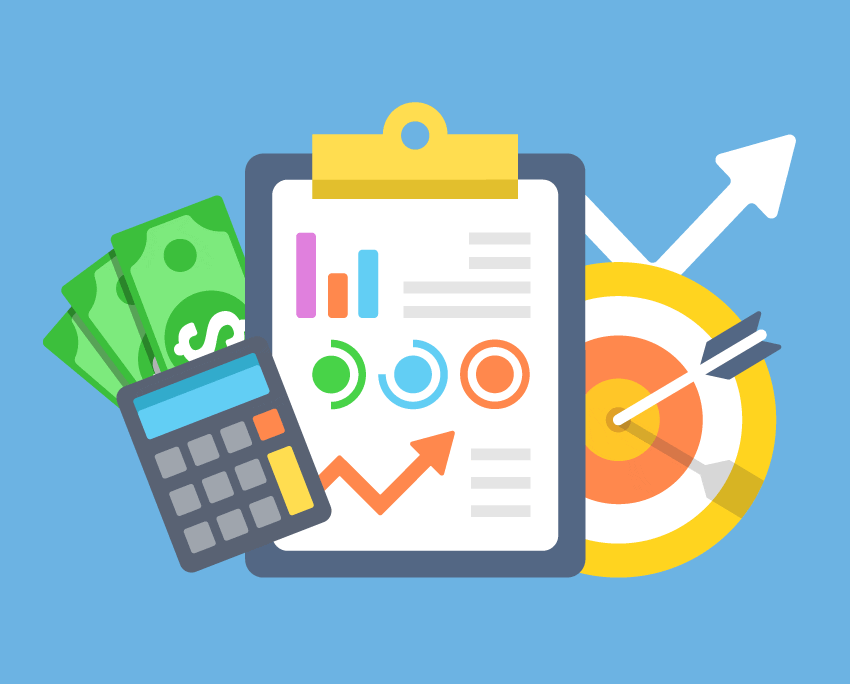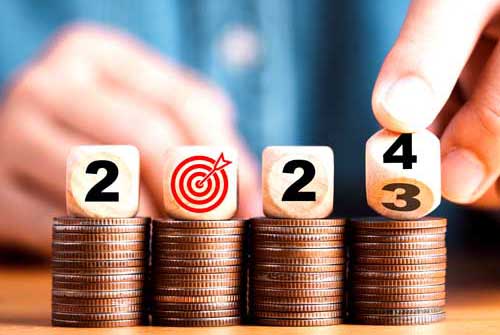Explore web search results related to this domain.
Setting short-term financial goals gives you the foundation and the confidence boost that you'll need to achieve the bigger goals that take more time. These first steps can relatively easy to achieve in as little as a year: Create a budget and stick with it. Build an emergency fund.
The budget you created when you started on your short-term financial goals will give you an idea of how much you need. You may need to plan for higher healthcare costs in retirement. Subtract the income you will receive. Include Social Security, retirement plans, and pensions. This will leave you with the amount that needs to be funded by your investment portfolio.To live comfortably now and in retirement, setting financial goals for the short-, mid-, and long-term is crucial. Here are the key steps to take.Proper financial and retirement planning starts with goal setting, including short-, intermediate-, and long-term goals. Key short-term goals include setting a budget, reducing debt, and starting an emergency fund.Setting short-term financial goals gives you the foundation and the confidence boost that you'll need to achieve the bigger goals that take more time. These first steps can relatively easy to achieve in as little as a year: Create a budget and stick with it. Build an emergency fund.
:max_bytes(150000):strip_icc()/GuidetoWealthPreservation-recirc3-v1-5e58c8e087884762bdfa52c83e698b32.png)
Helps you save money: A budget identifies areas where you can spend less, so you can use some of your money to achieve bigger financial goals, such as paying off debt or saving more.
Understand your income and expenses: The first step in creating a budget is identifying how much you earn and spend each month, as well as any extra income and expenses. Know how to track these numbers with help from the Consumer Financial Protection Bureau. Set clear financial goals: Whether it's saving for your children's education, buying a home, or planning for retirement, setting financial goals helps you stay focused and motivated.Use helpful tips from the Federal Trade Commission (FTC) to set and achieve your financial goals. Prioritize your expenses: Not all expenses are equally important. Prioritize spending on your basic needs, such as housing, food, and healthcare. Evaluate which expenses, such as eating out or subscriptions, you can reduce. Learn how to prioritize your expenses. Plan for the unexpected: An essential part of any budget involves considering unexpected expenses.Helps you save money: A budget identifies areas where you can spend less, so you can use some of your money to achieve bigger financial goals, such as paying off debt or saving more.Monitor your spending habits: Use tools like the Consumer Financial Protection Bureau's bill calendar to keep track of when you make payments and how much you pay for each item. This will help you avoid late fees and improve your credit. Review and adjust your budget regularly: The state of the economy and your personal finances can change from time to time.

... You’ll likely have a combination of short- and long-term goals to balance. Work your goals around your usual expenses, focusing on needs like food and shelter first. Emergency and retirement funds are also high priority; contribute to these funds and pay off debt next.
NerdWallet Planning powered by Quinn can help you build a personalized plan to get rid of debt, save more of your paycheck, and invest in your future. ... You’ll likely have a combination of short- and long-term goals to balance. Work your goals around your usual expenses, focusing on needs like food and shelter first. Emergency and retirement funds are also high priority; contribute to these funds and pay off debt next. Then you can decide how to allocate the rest of your money toward your wants and other savings goals. Know where you stand before you start to budget and save for your goals.Learn how to budget for short-term financial goals, like travel or home improvements, as well as long-term goals, like paying off your mortgage.You may reach your long-term goals quicker by putting your cash into a savings account or certificate of deposit with a high interest rate, or by investing, especially if you don’t plan to use this money for at least five years — say you’re starting a college fund for your newborn. That way you’ll allow time to build up a positive return. For retirement funds, here's how to choose between IRA and 401(k) accounts. ... Lauren is a personal finance writer at NerdWallet.Learn the difference between these financial goals, as well as how to budget and save for them.


Who It’s Best For Monarch is ... savings goals. The app provides a comprehensive personal finance platform, and you can budget on your own or with a partner. ... Monarch listens to its users and changes things accordingly. According to its website, new features are released monthly based on user feedback. Some other enticing features of Monarch include tracking net worth, investments, bills and ...
Who It’s Best For Monarch is best for those who want to link multiple financial accounts and make custom budgeting and savings goals. The app provides a comprehensive personal finance platform, and you can budget on your own or with a partner. ... Monarch listens to its users and changes things accordingly. According to its website, new features are released monthly based on user feedback. Some other enticing features of Monarch include tracking net worth, investments, bills and subscriptions; budgeting rollovers; and customizable spending reports.Looking for the best budgeting apps? Doing more banking from your phone? Here are nine best budgeting apps to help you manage your personal finances.Looking for the best budgeting apps? Doing more banking from your phone? Here are the seven best budgeting apps to help you manage your personal finances.We picked Empower Personal Dashboard™ (formerly Personal Capital) as the best budgeting app for tracking net worth because of its outstanding reporting, investment management and spend-tracking features. Why We Like It We like Empower because it gives customers a holistic view of their finances, from day-to-day spending to portfolio performance.
SMART goals are Specific, Measurable, Achievable, Relevant, and Time-Based. ... Keep a log of your income and expenses to get a better sense of where your money comes from, where it goes, and your patterns in handling your finances. You can do this manually (in a spreadsheet or notebook) or ...
SMART goals are Specific, Measurable, Achievable, Relevant, and Time-Based. ... Keep a log of your income and expenses to get a better sense of where your money comes from, where it goes, and your patterns in handling your finances. You can do this manually (in a spreadsheet or notebook) or automatically (using a budgeting app that tracks your transactions).Once you’ve created your budget, track your income and expenses to ensure you’re working toward your financial goals and staying within the bounds of your budget.Identify what you'd like to accomplish financially and create a plan to make it happen. We suggest setting SMART goals. SMART goals help you identify exactly what you want and how you plan to achieve it.You get to decide which expenses are needs and which are wants based on your personal and financial priorities. After you’ve fulfilled your needs, you should feel empowered to purchase your wants based on your priorities and financial abilities.

Buckets are customizable tools ... specific goals. Since they are an integrated bank account feature, they also might be easier to manage than a budgeting app. If you would rather have more robust budgeting tools, a budgeting app will likely still stand out to you. Budgeting apps also connect investment accounts, ...
Buckets are customizable tools that separate your savings so you can save for specific goals. Since they are an integrated bank account feature, they also might be easier to manage than a budgeting app. If you would rather have more robust budgeting tools, a budgeting app will likely still stand out to you. Budgeting apps also connect investment accounts, credit cards, and loans, so you'll be able to see everything in one place.Discover the best budgeting apps for January 2025. Our picks are free or have low subscription fees, as well as other standout features.The primary benefit of using a budgeting app is that it gives you a big-picture view of your financial situation. Many budgeting apps let you link different types of bank accounts, investment accounts, credit cards, and loans.We selected a well-rounded budgeting app, one designed for couples, another that's appealing for setting goals, and, lastly, one with more detailed budgeting features. We have a mix of free budgeting apps and ones that have premium plans with subscription fees, so you can choose an option based on your financial needs and priorities.

Compare Business Insider's 7 best investment apps for beginners. Find the right investing app for you and start trading stock today.
As a beginner, your investing app should suit your investment style and offer the tools you need (such as educational guides and/or courses, human advisor access, and strong customer support) to achieve your financial goals.You can easily browse potential investment opportunities by sorting through categorized stocks and ETFs. Complimentary financial planning is available for all SoFi members outside of the app, alongside additional benefits. Work with certified financial planners (CFPs) who can help you reach your goals.Betterment Investing offers cryptocurrency portfolios, socially responsible portfolios, tax-loss harvesting, personalized retirement plans, and options for charitable giving. You can use the investment app's goal-building strategies, such as retirement savings and income, creating a financial safety net, meeting cash goals, and building toward a major purchase.Set investing goals: Establish clear investment goals to focus on how you allocate the funds in your account. When starting, think of long-term investment goals to strive for. These include saving for college, retirement, or a housing fund.
It can bring you one step closer toward financial security. Having and sticking to a budget can keep your spending in check and assure that your savings for emergencies and longer-term goals, such as a comfortable retirement, stay consistent. ... Investopedia requires writers to use primary ...
It can bring you one step closer toward financial security. Having and sticking to a budget can keep your spending in check and assure that your savings for emergencies and longer-term goals, such as a comfortable retirement, stay consistent. ... Investopedia requires writers to use primary sources to support their work.A 50/30/20 budget, for example, suggests that you spend 50% of your budget on needs, 30% on wants, and 20% on your savings goals. The 70/20/10 budget, in contrast, says that you should spend 70% of your after-tax income on necessities and discretionary purchases, 20% on investments and savings, and 10% on debts or donations.Budgeting is a critical financial skill that is important for everyone, regardless of their level of financial knowledge. Learn how to budget, and the reasons why you should budget.Suzanne is a content marketer, writer, and fact-checker. She holds a Bachelor of Science in Finance degree from Bridgewater State University and helps develop content strategies. ... Saving vs. Investing: What Teens Should Know ... Credit Cards vs. Debit Cards ... A budget is a spending plan.
:max_bytes(150000):strip_icc()/GettyImages-1337933770-3d431c51f6e942d4b12280a8f1bfbefe-a3b94cde57b7418aad8cfc4e0b505621.jpg)
A good rule of thumb is to save 15% of your pretax income each year (or as near as your budget allows toward that goal). There are multiple options for where to invest your money. A couple of the most common include individual retirement arrangements (or IRAs) and 401(k)s. Participating in ...
A good rule of thumb is to save 15% of your pretax income each year (or as near as your budget allows toward that goal). There are multiple options for where to invest your money. A couple of the most common include individual retirement arrangements (or IRAs) and 401(k)s. Participating in your employer’s retirement program can be beneficial, since they may include company contributions in addition to your salary. According to a 2022 survey, 74% of Americans view homeownership as the pinnacle of financial achievement over having children, a degree or a career.Long-term financial goals that are key to achieving financial stability, security and independence — 17 examples for every age.Identifying your future needs early will help you make better financial decisions down the road. Think about the likely expenses you’ll have as a retiree. How much might you receive from Social Security? Will you have rent or mortgage payments? How much should you save for retirement to cover your estimated retirement budget? You can build your monthly savings plan around your expected future needs. Comparing these needs to your current income will help you determine if these goals are realistic and if you need to find new income streams.Everyone has unique needs and obligations that impact their financial foundation. Budgeting and saving can keep you on track to meet your long-term financial goals.


Personal finance software is a tool you can access on your computer or phone that might help you make a budget, set savings goals, track your investments, monitor your spending, or some combination of all four.
It can help you with anything from retirement plans, investments, tax payments, or just general budget planning, such as building an emergency fund. It's hard to build toward savings goals you can't visualize, and limiting your spending is difficult when you're not sure where your money is going. The best software for managing personal finances helps you visualize your goals, whether they be short-term goals like saving for a vacation or long-term goals like retirement.Then, you might consider using Google Sheets for a straightforward way of analyzing your spending and savings goals. · Even those who aren't as tech-savvy will find that Google Sheets has a simple, no-fuss setup process. All you need to do is set up a Google account and open the Google Spreadsheets tab. Then, you can select a general template for budgets or investment tracking and follow the steps listed on the spreadsheet.With this top personal finance software for budgeting, you'll be able to connect and keep track of bank accounts, investment accounts, loans, and credit cards. You'll also be able to create a 12-month budget.Usually personal finance software programs only have monthly budget plans. Quicken Deluxe also has a "what-if" tool that lets you see potential scenarios when you make certain investments or loan decisions to help you build a financial plan.
Setting financial goals can help you save money or pay off debt. Learn how to set financial goals and work with a credit counselor to achieve them.
Consider sticking to these 11 goals to help relieve yourself from financial difficulties. You can set the greatest goals possible, but it’s pointless if it’s not grounded in reality. Listing your expenses and income gives you a clear grasp of what you have to work with. A credit counselor can show you how to create a budget and come up with a reasonable plan to achieve your goals.You will need to create a business plan, find seed money, and stick to a monthly budget. Starting a business is meant to make money, not hemorrhage your own. ... Let’s face it, most goals aren’t fun to talk about. It’s good to have one that feels like a reward, like buying a boat or 80-inch TV or a cruise. Striving for something fun also reinforces the diligence and self-discipline required to reach all those other goals. Successfully transitioning out of the foster care system comes with unique financial needs and challenges.Setting up a budget, creating an emergency fund, and planning for stable housing are essential steps. Learning to manage expenses early on can build a foundation for a secure future. Resources are available to help those aging out of foster care to start their financial journey with confidence. Whether you do it yourself or rely on professional help, here are six steps to setting financial goals.Create a realistic budget. Get a strong handle on what’s coming in and what’s going out, then work it to address your goals. Use your budget to plug leaks in your financial ship.

After you have subtracted all necessary expenses from your income, you will be left with the excess money that you can spend or save. Common budgeting tools recommend saving about 20 percent of your income each month, which can be used for emergencies or can be kept in a savings account to grow.
What is a budget? Do I need one? At the most basic level, a budget is a way to keep track of the money you are getting and the money you are spending. A budget is a great way to make sure that you can cover your expenses from month to month. If you have a set income that you use to cover your expenses, chances are, making a budget is the right choice for you.LIT is a financial education program that teaches students how to manage their money while in school and prepare for financial life after graduation. Over the course of ~80 videos, LIT guides students through seven major personal finance topics: Money Mindset, Cash Flow & Net Worth, Credit & Loans, Taxes, Insurance, Investing, and Retirement.Having a goal in mind for your budget is important when you decide how much money to set aside and how much to spend. It is also important to know exactly where your money comes from, and know how much you are bringing in. If you have multiple sources of income, it might be helpful to make a list so you know how much money you are making each month. A great way to set up a budget is by calculating how much money comes in each month vs how much needs to come out (and make sure you add a little something for fun too!).After you have subtracted all necessary expenses from your income, you will be left with the excess money that you can spend or save. Common budgeting tools recommend saving about 20 percent of your income each month, which can be used for emergencies or can be kept in a savings account to grow.

Need a replacement for Mint? Make sense of your budget, get a grasp on your household spending, or check your credit score with the best apps we've tested for managing your personal finances.
Knowing where you stand with your money—your budget, credit score, expenses, income, and investments—is essential. PCMag has been covering apps for budgeting and managing personal finances for more than 15 years. If you commit to using a personal finance app, it can help you stay up to date with everything you need to know about your money, including how to get out of debt.The software comes in three versions so a beginner might like the Deluxe edition, and people who need more in areas like planning, investing, and small business money management could use Quicken Classic Business & Personal. Anyone comfortable working with Windows applications should find it easy to use. ... YNAB, which stands for You Need a Budget, is a unique personal finance app with a singular focus: to teach you smarter ways to spend your money so you can save more.Empower is a great personal finance app for investment tracking and retirement planning. It has some unique investment tracking tools, including a personalized Investment Checkup, a withdrawal planner, and a retirement fee analyzer. It does try to sell you advisory services, though, but you may want them. It only has basic transaction management and budgeting tools, and there's nothing about your credit health.It has a steep learning curve and requires regular attention, but the eventual reward is a flexible monthly spending plan that’s tailored to meet your goals. We included it because it’s built on a sound philosophy of financial responsibility and diligence that can change how you think about money. YNAB is designed for people who want more than personal finance apps typically give you in their budgeting tools, specifically.
While holiday plans fill the calendar, it's important not to let financial goals slide.
This is an excellent time of year to meet with a financial planner to assess progress toward long-term goals. Running financial projections and reviewing the past year’s performance can provide valuable insights and the motivation to stay on track. Investment allocations often shift over time, so year-end is a good time to rebalance.An annual review keeps policies aligned with goals and helps avoid costly oversights. ... Now is the time to review 2024 expenses and plan for changes in 2025. Building a realistic budget includes not only regular monthly costs but also planning for larger expenses, like vacations, home improvements, or education costs.Part of budgeting includes fine-tuning savings goals to reflect any changes in contribution limits or savings strategies.The holiday season seems to roll in quickly after Thanksgiving, with many shifting focus to travel, family, shopping, and other seasonal commitments. But while holiday plans fill the calendar, it's important not to let financial goals slide.
Finally, get moving on those six ... goals. Go ahead and start your free budget today with EveryDollar. ... Rachel Cruze is a #1 New York Times bestselling author, financial expert, host of The Rachel Cruze Show, and co-host of Smart Money Happy Hour. Rachel writes and speaks on personal finance, budgeting, investing and money ...
Finally, get moving on those six steps I mentioned to setting and reaching your financial goals. Go ahead and start your free budget today with EveryDollar. ... Rachel Cruze is a #1 New York Times bestselling author, financial expert, host of The Rachel Cruze Show, and co-host of Smart Money Happy Hour. Rachel writes and speaks on personal finance, budgeting, investing and money trends.Financial goals help you make progress with your money and get where you want to be faster. Find out how to set financial goals that make sense for you.Here are some more of the most common financial goals people set and tips for making them happen. Are any of these on your list? Need a better money plan? With the free EveryDollar budget app, you’ll save money, pay off debt, enjoy the things you love and take control of your finances.It’s a plan for what’s coming in (your income) and what’s going out (your expenses). You’re telling your money where to go instead of wondering where it went. When you have this plan for your money, you can feel confident you’re taking steps toward your goal every month. Budgeting helps you gain momentum in every area of your finances.

Treat your savings goals as non-negotiable expenses, like bills, and allocate a portion of your income to them first before you spend on discretionary items. After transferring money to your savings/investing accounts, allocate the remaining funds to cover your essential expenses such as rent, utilities, groceries, transportation, etc. The most common reasons people stop budgeting are that they tried to reach their financial ...
Treat your savings goals as non-negotiable expenses, like bills, and allocate a portion of your income to them first before you spend on discretionary items. After transferring money to your savings/investing accounts, allocate the remaining funds to cover your essential expenses such as rent, utilities, groceries, transportation, etc. The most common reasons people stop budgeting are that they tried to reach their financial goals too fast or saved too hard.Financial literacy is a valuable life skill that helps us make smart financial decisions. The better we understand the complexities of the financial world, the more empowered we are to take control of…Financial literacy is a valuable life skill that helps us make smart financial decisions. The better we understand the complexities of the financial world…Budgeting is a critical skill that builds healthy financial behaviors and habits. Establishing financial goals that are important to you and writing them down sparks a commitment to achieving those goals. Beginning to achieve small or short-term budgeting goals builds momentum for sticking with a plan and working toward longer-term goals.


It can bring you one step closer toward financial security. Having and sticking to a budget can keep your spending in check and assure that your savings for emergencies and longer-term goals, such as a comfortable retirement, stay consistent. ... Investopedia requires writers to use primary ...
It can bring you one step closer toward financial security. Having and sticking to a budget can keep your spending in check and assure that your savings for emergencies and longer-term goals, such as a comfortable retirement, stay consistent. ... Investopedia requires writers to use primary sources to support their work.A 50/30/20 budget, for example, suggests that you spend 50% of your budget on needs, 30% on wants, and 20% on your savings goals. The 70/20/10 budget, in contrast, says that you should spend 70% of your after-tax income on necessities and discretionary purchases, 20% on investments and savings, and 10% on debts or donations.Budgeting is a critical financial skill that is important for everyone, regardless of their level of financial knowledge. Learn how to budget, and the reasons why you should budget.Suzanne is a content marketer, writer, and fact-checker. She holds a Bachelor of Science in Finance degree from Bridgewater State University and helps develop content strategies. ... Saving vs. Investing: What Teens Should Know ... Credit Cards vs. Debit Cards ... A budget is a spending plan.

The categories for this budgeting ... and investments, and 10% goes toward debt payments or donations. · With a zero-balance budget, you're trying to get your income minus your expenses to equal zero. That means you use all your income each month — first, toward your essentials, and then, toward your wants and financial goals...
The categories for this budgeting strategy are: 70% goes to wants and needs, 20% goes toward savings and investments, and 10% goes toward debt payments or donations. · With a zero-balance budget, you're trying to get your income minus your expenses to equal zero. That means you use all your income each month — first, toward your essentials, and then, toward your wants and financial goals.If this is something you're interested in, consider talking to a certified financial planner before diving in. They can help you choose the best investments for your goals. Budgets are ever-evolving tools, and you'll need to track your progress, adjust, and recalibrate often — especially in the beginning.Learn how to budget effectively with expert tips and strategies. Take control of your finances and achieve your financial goals with our comprehensive budgeting guide.The next step is to create your budget — a specific plan for how you'll use your earnings each month and eventually achieve your financial goals. · There are several strategies for doing this, each with its own pros and cons. Here are a few of the options you might consider: According to Christensen, the 50/30/20 rule has become increasingly popular in the last 20 years. "It suggests you live on 50% of your income — housing, transportation, cell phone, utilities — enjoy 30% with dining out, recreation, or travel, and save and invest 20%."

Don’t give up on resolving to do better, psychologists and personal finance experts say. The key is to reframe the way you think about it.
Despite public perceptions that such resolutions are a waste of time, some findings suggest they can help people achieve their goals, at least for a while. A 2024 survey from the Pew Research Center found that a “large majority” of people who made New Year’s resolutions said they had kept at least some of them a few weeks into the new year. And Fidelity Investments, which annually surveys American adults about their financial resolutions, found that almost two-thirds of those who made resolutions for 2024 said they were able to stick with them.He advised choosing realistic goals and being prepared for change to take time.

Our Fidelity 2025 review explores how Fidelity stands out with its wide range of financial products, advanced trading platform, and low fees.
This may appeal to advanced traders looking to hand-pick investments and accomplish goals on their own time. ... Fidelity Go uses a combination of Fidelity Flex mutual funds in its Fidelity Go portfolios. According to Fidelity, these funds contain a mix of domestic stocks, foreign stocks, bonds, and other short-term investments. It provides unlimited access to a certified financial planner (CFP) with an account balance of $25,000 or more.If you want to invest in Vanguard's renowned ETFs and funds, you can open a Vanguard brokerage account for no minimum and no annual account fee. Vanguard is the stronger platform for financial professionals, retirement-focused individuals, and goal-based investing.Fidelity states that the purpose of a Fidelity Cash Management Account is to complement (not replace) an already existing brokerage account. The Cash Manager tool automatically moves funds between your Fidelity accounts to match your investment goals better.See how we rate investing products to write unbiased product reviews. Fidelity is one of the largest — and best — brokerage and robo-advisor platforms, offering a robust selection of trading tools, brokerage accounts, and advanced trading features. · Business Insider's personal finance team compared Fidelity to the best online brokerages and found it an industry leader for youth accounts and retirement planning.
:max_bytes(150000):strip_icc()/GuidetoWealthPreservation-recirc3-v1-5e58c8e087884762bdfa52c83e698b32.png)




:max_bytes(150000):strip_icc()/GettyImages-1337933770-3d431c51f6e942d4b12280a8f1bfbefe-a3b94cde57b7418aad8cfc4e0b505621.jpg)



